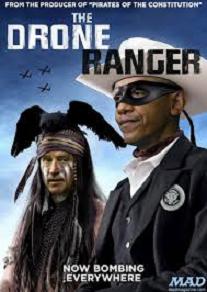 The president has already used drones to kill four Americans overseas, and appears poised to extend their use to the homeland, with his administration already having ordered the Federal Aviation Administration to expedite the process of integrating drones into civilian airspace.
The president has already used drones to kill four Americans overseas, and appears poised to extend their use to the homeland, with his administration already having ordered the Federal Aviation Administration to expedite the process of integrating drones into civilian airspace.
We must ask ourselves how far the president’s commander-in-chief authority extends. Will his current counterterrorism policy defend our liberties — or destroy them?
Instead of clearly defining the distinction between external threats versus citizens, Obama concluded the “threshold that we have set for taking lethal action applies to all ‘potential’ terrorist targets, regardless of whether or they are American citizens.”
If we adhere to our founding principles, we would use drones to fiercely defend our nation from external threats while still protecting our own citizens from their use at home. We would spend less time restricting drone use against foreign enemies, as the president did last week, and more time defining safeguards owed Americans.
When our founding fathers set out the new presidency’s military power in the Constitution, they used amazingly few words: “The President shall be Commander-in-Chief of the Army and Navy.” They were not being cagey. On the contrary, they needed no further description because the term “Commander-in-Chief” made perfect sense to the patriots of the Revolution — it meant the same powers that Commander-in-Chief George Washington had exercised to protect them. Accordingly, the Supreme Court often looks to this kind of history in determining the meaning of the Constitution today.
Washington was prepared to crush foreign threats with the full might of the American arsenal. While he obviously lacked modern technology, killing from afar is not a new phenomenon. Washington had sharpshooters and artillery with which he could eliminate enemy targets and a network of spies with which he could target individuals. The fundamental issue is not really about how we kill, but whom.
To Washington, it was the commander-in-chief’s prerogative to take out foreign targets as he saw fit. He had no qualms about shelling the British in Boston or approving a plan to kidnap a son of King George III because, to him, it was the commander’s role to vigorously defend Americans from external threats.
These precedents support the power of the president to employ drones vigorously against foreign enemies, but when it comes to citizens, our founding principles paint a very different picture.
During the Revolution, 15 to 20 percent of Americans supported the British. John Adams colorfully described these Loyalists as “spiders, toads [and] snakes.” At the same time, trampling the rights of even such a “despicable animal” violated the Americans’ commitment to republican principles.
The Loyalists who actively took up arms against their nation were shot on the battlefield. Other Loyalists, however, were merely suspected of treasonous acts, speaking out against the Revolution, or even serious assassination plots. This distinction between imminent violent threat and the less imminent law-breaker was crucial. Washington gunned down the former while protecting the rights of the latter.
Perhaps the Loyalist lawbreakers also deserved death, but what was important to Washington was that it was up to the courts to decide – not the military. Alexander Hamilton wrote of George Washington: “His Excellency desires to avoid nothing more, than the least Encroachment upon the rights of the Citizens.”
Technology will continue to change, but our values and our precedents should not. Washington refused to adopt a policy of summarily executing Americans. Based on his understanding of the laws of war and his role as the American commander-in-chief, that would have been a violation of American values.
Targeting foreign terrorists is something our Founders would applaud, killing U.S. citizens suspected of crimes is setting us on a slippery slope. What are the limits on our growing government’s power over Americans?
Beirne is an Olin Scholar at Yale Law School and the author of “Blood of Tyrants: George Washington and the Forging of the Presidency”

